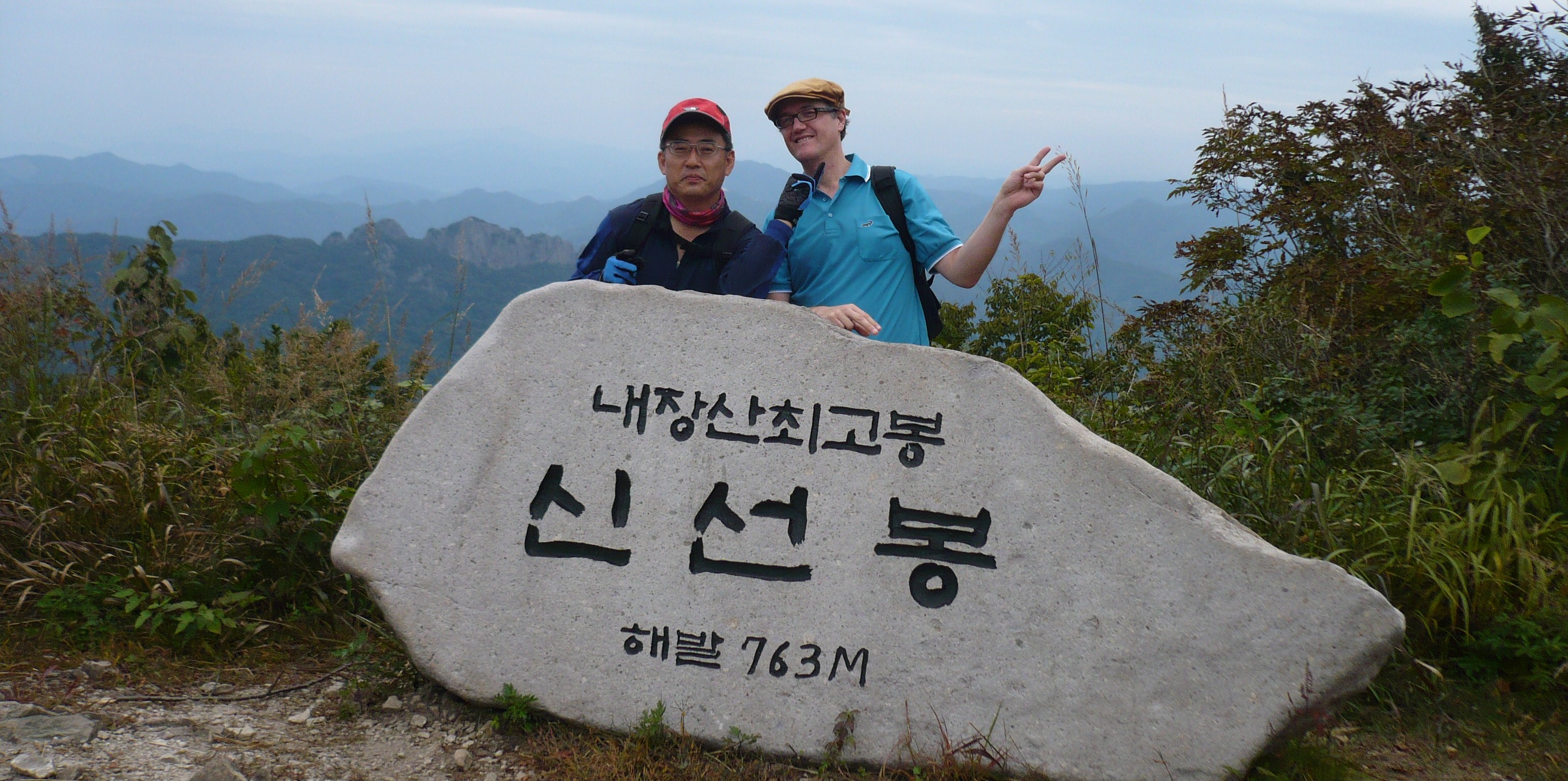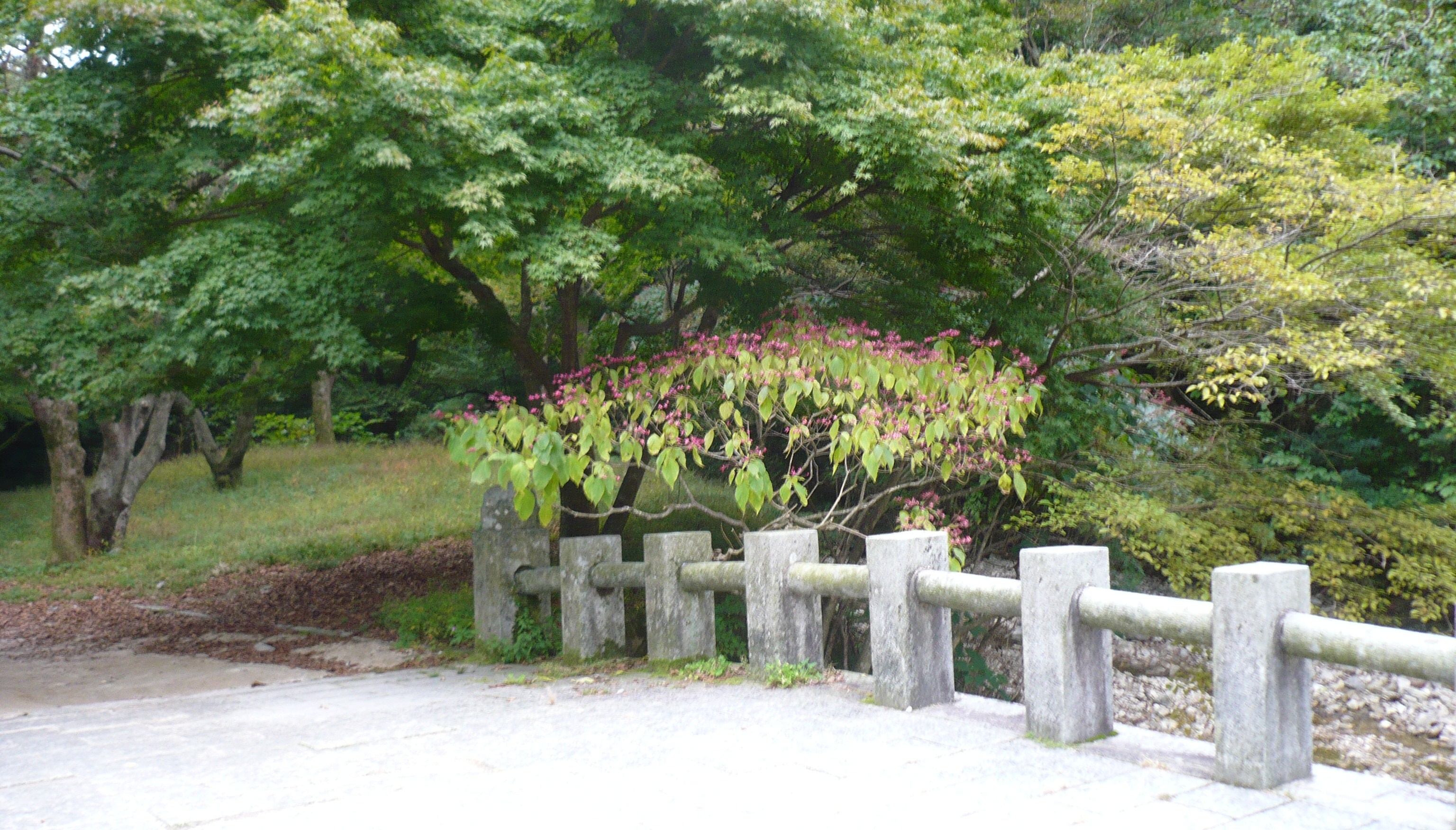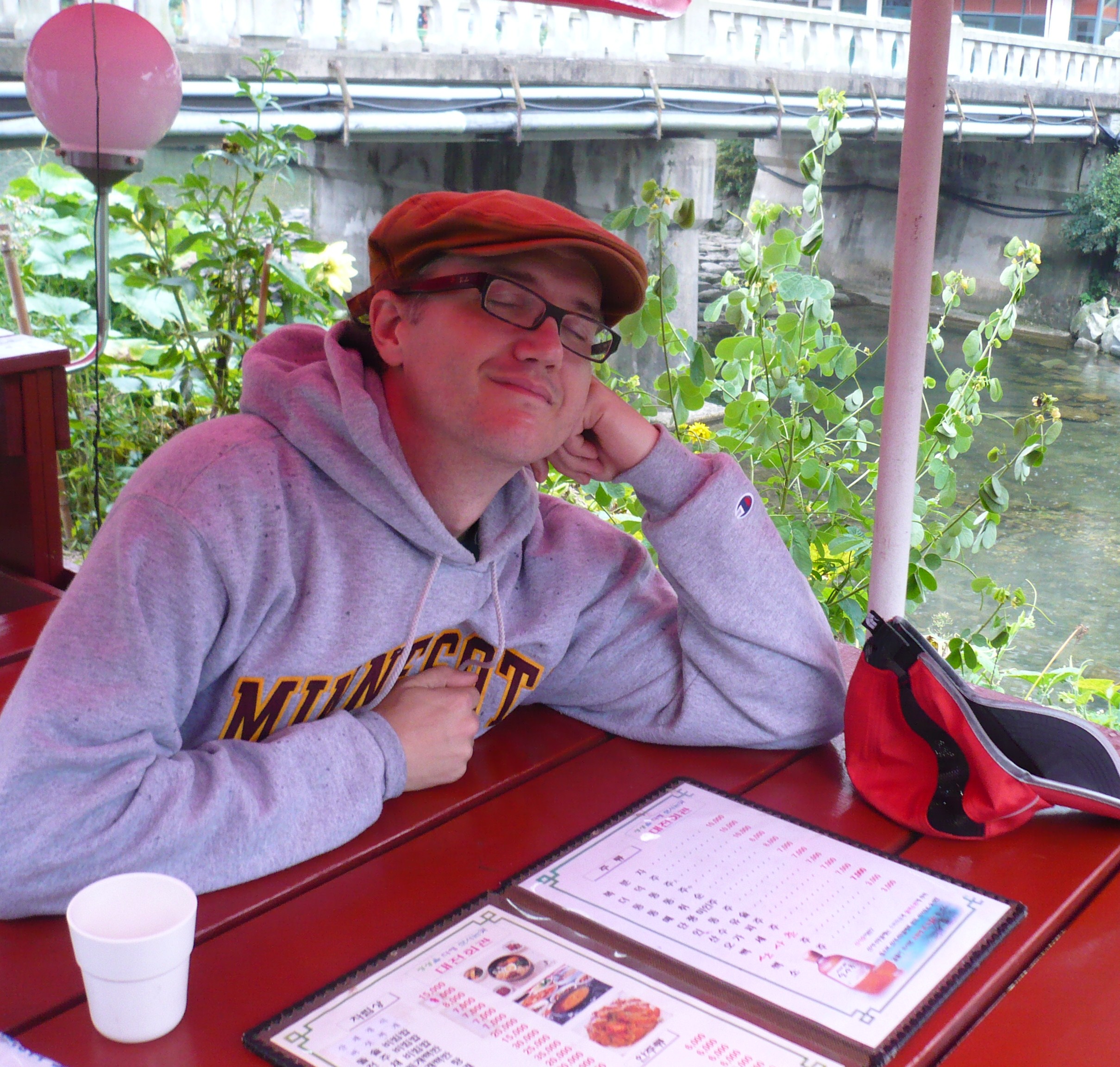"Don't hate the media, become the media" – Jello Biafra, Green Party activist, notorious San Francisco anarchist, and former lead singer and songwriter for the punk rock group Dead Kennedys.
There's always room for Jello.
Month: October 2010
Caveat: 당신은 특☆해요!
It was one of those miraculous, happy days, when putting up with all the sociopathic administrator bullshit becomes totally worth it. What I mean to say, is the kids came through. They delivered happiness and joy.
One student wrote to me: 당신은 특☆해요! (and explaining that ☆ is read as 별 = “star”), hence “당신은 특별해요” [dang-sin-eun teuk-byeol-hae-yo = you are special]. Aww, shucks. I thought that’s what teachers were supposed to write to their students, not vice versa.
Then, I was in the courtyard, with about five minutes before having to go upstairs to the third grade. A group of third graders saw me, and said, oh, teacher, you must come to class. They grabbed me by my hands and hauled me up the stairs as if I was an unruly child, and then when I got there, things were still clearly in a state of recess, so I said, why am I here?
“Fun!” was the chorus.
In another third grade class, I was going through my beginning-of-class routine – I ask students (not always every single one, but at least half, one by one) “how are you?” I try to get them to vary their answers, and not always use the pat “I am fine” that they all seem to learn early on. And whatever their answer, I occasionally ask “why?” and try to get them to give some information as to why they feel the way that they do.
So… I asked one student, “how are you?”
“Oh! Very happy,” calm, but grinning.
“Why?”
“Because you.” And she pointed at me. I almost blushed in self-consciousness.
That was pleasing.
Finally, I was in my evening “gifted students’ class” which is at the county education office here in Yeonggwang. I have about 22 smart – and smart-alecky – but not always focused sixth graders. Things had been feeling a little bit slow. But then I introduced them to my Jeopardy quiz show concept. And they ran with it.
We had to modify the rules a little bit, because it was such a large group (22 contestants is a lot, to have to consult each student’s answer individually). But it worked very well: I had them scrawling down answers on scraps of paper and throwing them at me, I would read their answers and say “good” or “bad.” I would award money (yes, my ubiquitous play money) appropriately. And the kids started to have a huge amount of fun. They would write truly funny things when they didn’t know the answer. I would read them in my best game-show-host demeanor, and then begin laughing uncontrollably and toss the scrap of paper with the answer back into the crowd. It had the same atmospheric as one of those always playing Korean comedy game shows. It felt very successful. Everyone was laughing. No one noticed it was time to leave.
I walked home and passed the pizza place where some of the expats meet on Fridays… I didn’t really even realize I was walking along that particular street. The owner saw me and leaned out the door, “안녕하세요.” I answered in kind, “예, 안녕하세요.”
Caveat: Objectivism
"Objectivism: the spongy white bread at the Great Buffet of Human Ideas" – John Scalzi, in his screedtastic bloggings on the topic of Ayn Rand's Atlas Shrugged. I would add: spongy white bread is delicious and comforting, but not good for you, and may contribute to health problems if not to an early death.
Perhaps this is what Scalzi has in mind. I think I can agree with a large proportion of what he's saying, which is hard for me to find among people who actually enjoy Rand's writing. His main insight: Rand writes "nerd revenge porn" – which is why fans of Rand are mostly to be found somewhere on the Aspergers spectrum. I will not be so proud as to deny I might be along there somewhere, myself.
My main thought on being a nerd: being a nerd is like being an acoholic or a drug addict – you cannot be cured, but you can be recovering. I am a recovering nerd. As long as I accept this, I can make progress. Rand's writing is a different approach: it says that being a nerd is holy, and there's nothing to recover from. In essence, it denies the normality of human collective social experience. Rand is to being a nerd as William S. Burroughs is to being a herion addict. Personally, I think both are wonderful writers. But I don't think they're offering viable life-philosophies. It's fantasy.
Caveat: 6) 나의 몸을 소중하게 여기지 않고 살아 온 죄를 참회하며 절합니다
“I bow in repentance of any misdeeds lived, not regarding my body as something dear.”
The parallelism continues. Maybe, at this rate, I’ll figure out what the grammar is trying to do. Out of 108 affirmations, I’m now on number six.
…
4. 나는 어디서 왔는가, 어디로 갈 것인가를 생각하지 않고 살아온 죄를 참회하며 절합니다.
“I bow in repentance of any misdeeds lived, wherever I think I may have come from, wherever I think I may go to.”
5. 나는 누구인가, 참 나는 어디있는가를 망각한 채 살아 온 죄를 참회하며 절합니다.
“I bow in repentance of any misdeeds lived, forgetting wherever I may be, whoever I may be.”
6. 나의 몸을 소중하게 여기지 않고 살아 온 죄를 참회하며 절합니다.
I would read this sixth affirmation as: “I bow in repentance of any misdeeds lived, not regarding my body as something dear.”
The first clause seems to literally say, “and not regarding my body preciously.” I settled on the above both with a mind to keeping the parallelism with the previous two affirmations, and to try to make sense of it. I’m not sure that I didn’t take too many liberties with the meaning, though.
[UPDATE: So it occurs to me, on rereading this much later, that I have misunderstood this aphorism – this one, and all those that have the same structure “…misdeeds lived, not regarding…”. The “not regarding my X” is in fact an example of the “misdeeds lived” – which is to say, you’re repenting for failing to experience the feeling in question.]
Caveat: X
Not a perfect man. But a truly great American: liberty and justice for all – "By any means necessary."
Malcolm X. Oxford Union Debate, Dec. 3 1964 from Jason Patterson on Vimeo.
I saw this video posted on Ta-Nehisi Coates' blog. Some commenters remarked on the parallelism between X's rhetoric and the neo-constitutionalist talk of tea-party types. One commenter, however, made the difference quite clear, and stated it eloquently and simply:
There's such a thing as a right to rebellion, and the rhetoric of revolution is always at hand as a tool. But the right to rebellion requires that your rebellion be right.
Caveat: The Yeonggwang Culture & Language Gang
The name sounds very ambitious. I suppose anytime one tries to form a club or social grouping, that’s rather ambitious. I’ve been working on this for a month or two. I guess I’m hoping we can have an institution of “foreigners” in the Yeonggwang area who meet to study a little bit, find out more about the culture or language without the overwhelming aspect of trying to do so with actual Koreans.
We’ve been meeting every Tuesday. One day, we made kimbap. Another time, we watched a movie. Each class, we try to talk a little bit about the language – but everyone’s at a different level, so it doesn’t always go smoothly, in that respect.
Today, only two people (along with myself) showed up. We sat in the Paris Baguette (a Korean chain bakery store, about the closest Yeonggwang gets to cafe culture) by the bus terminal and drank some coffee and talked about verbs for a while.
I hope the group can be successful, but it’s hard building any kind of expat community on any kind of basis, here, because there are so few, and interests are so diverse. A guy named Jim has done a fabulous job with his Friday night pizza & beer gatherings, and I often go to those, too. But I was trying for something that would provide some group encouragement and motivation for the language study – I figured even though I was more advanced, I would nevertheless benefit from a motivational standpoint. And I have.
Having so few people able and interested in participating is a little bit disappointing. But … 아자 아자… I hope this can work.
Caveat: Metamoderation
"Moderation in all things. Including moderation." – Mark Twain
I think I've found a new favorite quote. Now, to work with implementation – I'm actually really not that good at moderation – I've always had a degree of "all or nothing" about my personality. Hence this Twainian metamoderation seems likely to be exceptionally challenging.
But I've been thinking a lot about habits, lately, and about bad habits and good habits. Small things – eating well, exercising, getting work done rather than procrastinating, mostly abstaining from alcohol but not being a teetotaler, etc. I watch myself, over time: I build up a habit, good or bad, and then tear it down again.
I found written in my private journal, a few days ago, the following disconcerting observation (or was I attempting poetry?): "I slip into and out of my private dysfunctions with a great deal of grace."
Caveat: 5) 나는 누구인가, 참 나는 어디있는가를 망각한 채 살아 온 죄를 참회하며 절합니다
“I bow in repentance of any misdeeds lived, forgetting wherever I may be, whoever I may be.”
This is #5 out of a series of 108 daily Buddhist affirmations that I am attempting to translate with my hands tied behind my back (well not really that, but I’m deliberately not seeking out translations on the internet, using only dictionary and grammar).
…
3. 지극한 마음으로 승가에 귀의합니다.
“I turn to the Sangha [Buddhist community-of-faithful] with all my heart.”
4. 나는 어디서 왔는가, 어디로 갈 것인가를 생각하지 않고 살아온 죄를 참회하며 절합니다.
“I bow in repentance of any misdeeds lived, wherever I think I may have come from, wherever I think I may go to.”
5. 나는 누구인가, 참 나는 어디있는가를 망각한 채 살아 온 죄를 참회하며 절합니다.
I would read the fifth affirmation (with the same reservations and caveats as the last one’s) as: “I bow in repentance of any misdeeds lived, forgetting wherever I may be, whoever I may be.”
Fortunately, there is a lot of parallelism, from affirmation to affirmation. As a consequence, I could rely on the hard work invested in making sense of the fourth one to try to sort out this next one.
I’m still not comfortable with the connection between the main clause (second part of sentence, “I bow in repentance of any misdeeds lived”) and the preceding clause (first part, “forgetting …”) – not in this affirmation nor in my translation of the last one. But I don’t really see how it works – is the first clause subordinate or coordinate, or is it a clause standing as some kind of noun or adjective modifying or modified by “lived”?
[UPDATE: So it occurs to me, on rereading this much later, that I have misunderstood this aphorism – this one, and all those that have the same structure “…misdeeds lived, forgetting…”. The “forgetting my X” is in fact an example of the “misdeeds lived” – which is to say, you’re repenting for failing to experience the feeling in question.]
Caveat: (bio-)diversity
New York City is justifiably famous for being one the most diverse places in the world, in human/cultural terms. But it turns out that the city is equally notable for its biodiversity, according to an article in New York magazine (that I found out about in Tom Scocca's blog). Partly, it seems that it's not just humans that land in New York City as immigrants and find the city a hosptitable place – the population of "invasive species" is huge. But it all seems to sort of work. Kind of just like the human experiment called NYC.
Interesting.
I read about things like this. I reflect on the complex coexistence of nature and urbanism that I see in a country like South Korea (which I read is the second most densely populated country in the world, after Bangladesh – if you take city-states such as Singapore and Monaco out of the running). I begin to wonder if those "population alarmists," who feel that the world is doomed due to human overpopulation, are completely wrong. Human population is, without a doubt, radically altering ecosystems – including, of course, global climate change. But… that doesn't mean that these radically altered ecosystems will necessarily "collapse" or be unsustainable.
I guess, when you get right down to it, I'm not a apocalypticist, but rather a transhumanist, in futurist matters.
Caveat: Additional Pictures From Yesterday
Caveat: Hiking up, hiking down, and then it rained
I went on a great hike with my friend Mr Kim, today, at 내장산 [naejangsan]. Up the mountain, and down again, pretty fast (about 4 hours). Rain threatened, and then, as we were arriving at the bottom, raindrops. We sat under a canvas awning in a vacant restaurant in the little tourist ville at the entrance to the park area, and ate 전 [jeon = Korean egg and vegetable pancake] and 김치찌깨 [kimchijjikkae = kimchi stew]. And it rained. It was beautiful, and very relaxing.
Here is a picture from the inevitable temple-at-the-bottom-of-the-mountain we stopped at. And a picture of me at the restaurant. I’ll post more pictures tomorrow.
Caveat: Fascinatinger
"I try to make things fascinatinger." – Ira Glass (host of NPR's "This American Life" show).
My thought: the key to life is to stay interested. That's where living in a foreign country and teaching children come in – they keep me pretty interested, even if things aren't always easy or perfect or convenient.
I have begun to really enjoy my first graders, even though I have yet to have a "good" class with them – they're so unruly, so chaotic, so difficult to calm down and control even for a few minutes. Their picture will be included in a definition of the expression: "…like herding cats."
So why am I enjoying them? Hmm… I think it comes down to the same reason I enjoy trying to learn Korean – the sheer perverse difficulty of the undertaking, in and of itself, is what I enjoy.
I see the little ones, my first graders, filtering into the classroom, and I watch myself carefully. What am I doing that "works"? What am I doing that "doesn't work"? How does the dynamic among the children inevitably result in milling, leaping, sitting-on-the-kid-next-door, shrieking, impossible-to-control chaos?


















